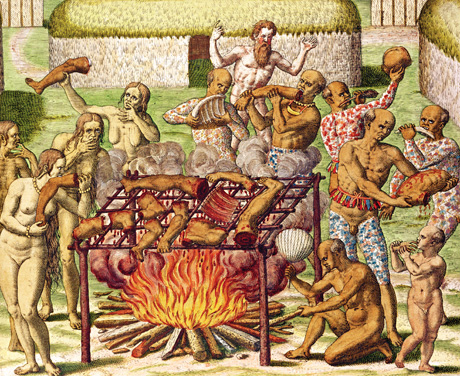 |
| Gâteau d'anniversaire pour les 30 ans de Chris |
Emission de Vincent Charpentier du 22.12.2010
Invité : Georges Guille-Escuret , chargé de recherche CNRS
La vaste entreprise d’anthropologie historique de l’auteur représente plus d’une vingtaine d’années de recherches de terrain. Il livre avec cet ouvrage le premier volet d’une série monumentale qui en comprendra deux autres, sur l’Asie-Océanie et sur le continent américain. "
--
The Raw and the Cooked: An Interview with Cătălin Avramescu
"L’idée d’une société assumant le fait que ses membres se nourrissent de corps humains constitue une source intarissable de répulsion au sein de la civilisation – en particulier quand l’absorption succède à un acte de violence, et traverse la frontière qui sépare la guerre de la chasse. Embarrassée à plus d’un titre par le thème du cannibalisme, l’anthropologie sociale l’a laissé en friche et continue à osciller entre des déterminations simplistes : cause alimentaire ou motif religieux.
Pour des sciences qui se proposent d’appréhender des réalités hétérogènes, telles que la sociologie, l’histoire et l’écologie, l’occasion s’offre alors d’un double défi à relever : se délivrer de convictions parasites maintenues par la civilisation qui les a engendrées, et combattre enfi n de face l’aveuglement terrible et millénaire qui range toute anthropophagie dans le registre de la préhistoire et de la bestialité. En réalité, la dimension historique des sociétés dites « primitives » n’apparaît jamais aussi visiblement que dans les manifestations concrètes du cannibalisme.
--
The Raw and the Cooked: An Interview with Cătălin Avramescu
"What was significant for the moralist was not always what you eat, but how. In other words, what was at stake in early modern ethical discourse was not primarily the substance of the food, but the manners of the table. In the seventeenth century, for instance, refined cuisine was not for the faint-hearted. How animals were raised, sacrificed, cooked, and consumed reveals a brutal side of the early modern heart. I suspect things have not changed much to this day; back then, however, this brutality was more open for anyone to see. In an age of increasing refinement, this paradox troubled a few minds. They wept and yet they ate the objects of their compassion."
Cătălin Avramescu is a philosopher based in Bucharest. His books includeAn Intellectual History of Cannibalism (Princeton University Press, 2009). For more information, see web.me.com/avramescu.Justin E. H. Smith teaches philosophy at Concordia University in Montreal. He is the author of Divine Machines: Leibniz and the Sciences of Life(Princeton University Press, 2011). His new book project is entitled Nature, Human Nature, and Human Difference: Early Modern Natural Philosophy in Global Context, 1600–1800.

Aucun commentaire:
Enregistrer un commentaire